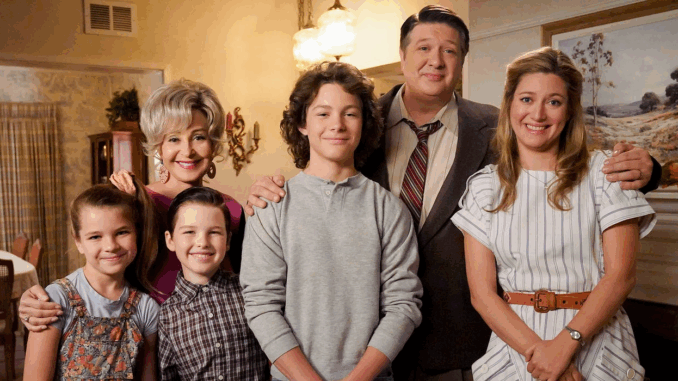
For years, Young Sheldon charmed audiences with its heartfelt blend of humor, family dynamics, and the brilliant awkwardness of a young Sheldon Cooper. It was more than just a prequel—it was a series with its own emotional depthand identity.
But somewhere along the way, something shifted. A particular plotline turned the show in a direction that left fans divided—and some would argue, it ultimately led to its cancellation.
So what happened? And why do so many longtime viewers say Young Sheldon was never the same afterward?
The Plot in Question – George Sr.’s Infidelity
Let’s cut right to the heart of the matter.
The Infidelity Arc Changed Everything
The storyline that changed the course of Young Sheldon was the slow build-up to George Sr.’s implied infidelity, a moment foreshadowed heavily in The Big Bang Theory and finally addressed head-on in Young Sheldon‘s later seasons.
Fans always knew something tragic was coming. Canon dictated that Sheldon’s dad would eventually die young, and that Sheldon would carry emotional scars—especially related to catching his father cheating.
But when Young Sheldon started leaning into the affair arc, the tone of the show grew darker, and the cozy, light-hearted family dynamic began to fracture.
A Family Sitcom Turned Into a Slow-Motion Tragedy
What started as a quirky family sitcom with wholesome lessons suddenly felt like it was counting down to catastrophe.
Shifting From Comedy to Drama
-
Earlier seasons: Focused on schoolyard humor, family quirks, and relatable Southern charm.
-
Later seasons: Introduced more tension, marital strife, and a looming sense of doom.
Fans started to ask: Is this still the same show I fell in love with?
Why the Infidelity Plotline Hurt So Much
1. It Undermined George Sr.’s Growth
In Young Sheldon, George Sr. was portrayed as a good man struggling under pressure, trying to keep his family together. Fans appreciated the redeeming qualities the show gave him—especially since Big Bang Theory painted him so negatively.
So when the cheating angle was reintroduced, it felt like a betrayal of that character growth. Instead of rewriting the narrative, it doubled down on the pain.
2. It Derailed the Show’s Warmth
The early heart of the series was built on Mary and George’s teamwork, Missy and Sheldon’s sibling bond, and Meemaw’s cheeky support system. But as the affair storyline took center stage, the family warmth got overshadowed by mistrust and sadness.
Fans React – “This Isn’t What We Signed Up For”
Social media exploded with mixed reactions:
-
“I get that it’s canon, but I don’t want to see George cheat. He’s been so kind and loving here.”
-
“This isn’t the same show anymore. It’s too heavy.”
-
“I just wanted to laugh—not cry every week.”
Some defended the decision as necessary for narrative closure, but many long-time viewers felt emotionally blindsided.
Ratings Took a Hit Post-Affair Plot
Though Young Sheldon remained popular, there was a notable dip in viewership and fan engagement during and after this arc.
It’s no coincidence that the series’ cancellation came shortly after this tonal shift.
CBS cited the show reaching its “natural conclusion,” but fans speculated that losing its original tone may have played a part in the decision to end it after Season 7.
Did Canon Doom Young Sheldon From the Start?
To be fair, the show was always heading toward some painful truths:
-
George’s death
-
Sheldon’s trauma
-
Mary’s descent into extreme religious rigidity
-
The family slowly splintering
But could there have been a more creative or gentle way to honor canon without completely shifting the show’s energy?
That’s the question still up for debate.

What Fans Wanted Instead
More Slice-of-Life, Less Tragedy
Many fans hoped the writers would focus more on Sheldon’s academic journey, Meemaw’s love life, or Missy’s coming-of-age story rather than leaning into doom and gloom.
The show had the chance to explore those dynamics with heart and humor, but the focus on George’s infidelity created a cloud that lingered over everything.
The Cast’s Reaction to the Plot Twist
The cast remained professional, but even they admitted in interviews that the final season had a very different energy.
Zoe Perry (Mary Cooper)
“It was hard emotionally… We love these characters. Watching them go through heartbreak was difficult to portray.”
Lance Barber (George Sr.)
“George Sr. was always a complex man. Playing out his downfall was a challenge.”
The Final Blow – George’s Death
The infidelity arc built to its natural end: George’s sudden death, something Big Bang Theory fans always knew was coming.
But by the time it happened, many viewers felt numb rather than moved—exhausted from the previous episodes of emotional decline.
Instead of catharsis, the finale felt like a formality, closing a chapter that had already lost its momentum.
📝 Conclusion – A Show That Lost Its Way
Young Sheldon started as one of the most emotionally rich and refreshing sitcoms of its time. But once it veered into tragic foreshadowing and darker storylines, something fundamental changed.
The heart of the show—its warmth, humor, and grounded characters—was overshadowed by the need to align with a painful canon.
Did it make for powerful storytelling? Maybe. But did it cost the show its soul? A lot of fans would say yes.
❓ FAQs
1. Why did Young Sheldon end after Season 7?
CBS cited creative closure and alignment with Big Bang Theory canon, but tonal shifts and fan backlash likely played a role.
2. Did George Sr. actually cheat in Young Sheldon?
The show heavily implied an affair but stopped short of showing definitive proof—staying true to canon but leaving some ambiguity.
3. Was George’s death in Young Sheldon faithful to Big Bang Theory lore?
Yes, Sheldon had referenced his father’s death in TBBT, and Young Sheldon stayed true to that timeline.
4. Could the show have continued past Season 7?
Many fans believe it could have, especially if it had focused more on other family members and side plots.
5. Is a spinoff still happening?
Yes—Georgie & Mandy’s First Marriage, a new spinoff, is in development and continues the Cooper family saga.